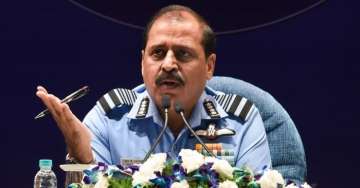Conflict with India not good for China, says IAF chief
Any serious Sino-Indian conflict won't be good for China, Chief of the Air Staff Air Chief Marshal RKS Bhadauria said on Tuesday.

Any serious Sino-Indian conflict won't be good for China, Chief of the Air Staff Air Chief Marshal RKS Bhadauria said on Tuesday. Addressing an online seminar, Air Chief Marshal Bhadauria, referring to the eastern Ladakh row, suggested that any such conflict with India does not suit China's global aspirations and "grand plans". Bhadauria said the face-off could be the result of a "military-dominated misadventure" that escalated following the rapid trust deficit Beijing faced in the wake of the coronavirus pandemic.
He saw the standoff triggered by China possibly a plan to engage with India in the border from a new position or an aim to fine tune Beijing's new military structure and technologies. "The important question for all of us is any serious Indo-China conflict is not good for China. If Chinese aspirations are global, then it does not suit their grand plans. Then what could be the possible Chinese objective for their actions in the North. This is important to understand," he said.
"In any case, what has happened is all of the above irrespective of what was the starting objective," he said, adding the Chinese action in eastern Ladakh could also be totally a "military dominated misadventure" that escalated given the rapid trust-deficit the country faced post-COVID-19.
Air Chief Marshal Bhadauria said the Chinese military resorted to heavy deployment of military systems like surface-to-air missiles and radars but added that India has also taken steps to deal with the situation.
READ MORE: India, China agreed that next round of military talks should be held soon: MEA
In his remarks, Air Chief Marshal Bhadauria also said that Pakistan was increasingly becoming a pawn in Chinese policy. "Under the increased CPEC (China Pakistan Economic Corridor) debt trap, we are going to further witness (its) military dependency."
About China using Pakistan to gain entry into the war-torn Afghanistan after the exit of US forces, he said: "US exit from Afghanistan has opened options for China in the region, both direct and through Pakistan, allowing it entry into Central Asia, a region they have been eyeing for long."
The Chief of the Air Staff said India needs to focus on boosting its overall military capability to ensure a rapid and effective response mechanism.
At the same time, he added that the Indian Air Force is fully capable of dealing with any scenario but pitched for enhancing the country's overall air power considering the evolving regional security architecture.
"This would require a focused approach especially with respect to China as they have invested heavily in research and development and have grown manifold in capabilities and technologies," he said.
The IAF said the regional security scenario could become more challenging following withdrawal of the American forces from Afghanistan and suggested that China could try to expand influence using Pakistan.
Air Chief Marshal Bhadauria also extensively deliberated on the rapidly changing nature of warfare and referred to the potential threat emanating from drone technology that was in full display during the recent conflict between Azerbaijan and Armenia over the Nagorno-Karabakh region, Syrian war as well as in the attack on oil installations of Saudi giant Aramco.
"The texture of these conflicts are a reflection of future warfare. There are important lessons for us and we will factor in all these as we move forward," he said.
Air Chief Marshal Bhadauria said the IAF is actively pursuing niche technology in the field of space-based capabilities, artificial intelligence, big data analysis in making the force's targeting cycle highly effective.
"The IAF is completely capable of dealing with the changing nature of warfare. We have reoriented our capability requirement for future wars based on developments in recent past," he said.
The IAF Chief said his force is actively pursuing anti drone and swarm drone technologies for a highly networked air battle scenario.
Air Chief Marshal Bhadauria also strongly pitched for indigenous platforms and weapons for the armed forces in the long-run to maintain technological edge, suggesting long wait in arrival of the imported ones become obsolete by the time they are delivered.
(With agency inputs)